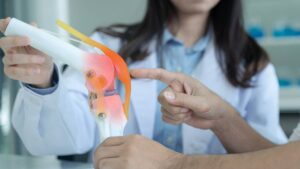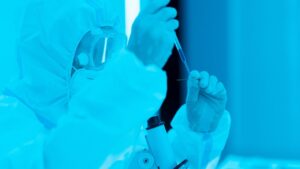Health Check: Clinuvel, Telix shares surge on regulatory breakthroughs in Europe and US

Shares in Clinuvel and Telix are on a run today after European and US approvals relating to drug dosing and pricing. Pic: Getty Images
- Drug developers Clinuvel and Telix win key concessions on dosing and pricing
- Biogene ‘mite’ be on to a good thing with its tick-prevention program
- Hooray, hooray: Algorae goes commercial
Clinuvel Pharmaceuticals (ASX:CUV) has won a victory with European health regulators, who have removed the maximum dosing limit on the company’s skin disorder treatment, Scenesse.
Europe and US regulators have approved Scenesse for the rare sun intolerance disorder, abbreviated as EPP.
To date the Europeans allowed one Scenesse implant every four months, but now they will take the US lead and allow an all-year round treatment.
The drug is meant to be taken once every two months.
The European Medicines Agency reviewed 15 years of Scenesse clinical data, as well as ‘real world’ evidence. The agency saw a “positive benefit-risk profile from uninterrupted dosing”.
“A decade after EMA’s approval of Scenesse, we have generated a much deeper, richer pool of data helping to define the drug’s benefit-risk profile, with a dossier that supports year-round patient dosing,” Clinuvel chief scientific officer Dr Dennis Wright said.
“We … are pleased that [the decision] will enable EPP patients to receive year-round treatment for this very debilitating condition.”
Clinuvel derives most of its revenue from the US, so the ruling won’t have a direct financial benefit. But it’s good for patients.
The “robust safety data” also reinforced Scenesse’s safety as the company pursues an approval for the much more common vitiligo.
Thus far, Clinuvel has administered 18,500 doses to EPP patients globally.
Clinuvel shares jumped up to 10% this morning.
Telix wins outpatient reimbursement
Telix Pharmaceuticals (ASX:TLX) shares spurted as much as 22% after the radiopharmaceutical leader won US Transitional Pass-Through (TPT) status for its prostate cancer imaging agent, Gozellix.
The Centers for Medicare & Medicaid Services bestows TPT, which allows for reimbursement in a hospital outpatient setting.
Patients also don’t make a 20% co-payment.
‘Radiolabeled’ with gallium isotopes, Gozellix enhances positron emission tomography scanning of certain patients with suspected metastasis, or suspected biochemical recurrence.
“This reimbursement milestone will reduce the out-of-pocket burden for patients, enhance patient access to advanced prostate cancer imaging and simplify payment for providers,” Telix chief medical officer for precision medicine Kevin Richardson says.
Telix now has two FDA-approved and reimbursed products. The other is Illuccix, also for prostate cancer.
Biogene wins ‘tick’ of approval
Bio-Gene Technology (ASX:BGT) shares almost doubled this morning after the novel insecticide developer said its flagship candidate Flavocide had “acaricide potential”.
Scrabble lovers take note: that word means Flavocide has a lethal effect on mites and ticks.
The company says US lab efficacy studies showed Biogene’s Flavocide wiped out 90% of Ixodes scapularis nymphs. This is a type of tick and a key cause of Lyme disease in the US.
Flavocide was still active up to four weeks after application.
“Tick-borne diseases are a growing public health concern, with Lyme disease cases continuing to rise across the US,” Purdue Uni entomology professor Catherine Hill says.
Reflecting that, the US Center for Disease Control funded the research.
The results were presented at the 17th International Conference on Lyme Borreliosis and Other Tick-Borne Diseases in Chicago.
Sadly, our invite got lost in the mail.
Meanwhile, Bio-gene’s programs span crop protection, grain storage, public health and consumer uses.
Bio-gene’s compounds occur naturally, thus overcoming growing pest resistance to current insecticides.
Minnow Algorae teams with US$7.7 billion drug giant
AI-enabled drug developer Algorae Pharmaceuticals (ASX:1AI) has signed a commercial agreement with Indian drug maker Sakar Healthcare to launch five generic oncology medicines locally and in New Zealand.
Sakar is headquartered in Ahmedabad and listed on the New York Stock Exchange, with a US$7.7 billion market cap.
Algorae puts the local addressable market for the five drugs at $10 million annually.
To date, Algorae’s activities have centred on research and development, via a program with Melbourne’s Peter MacCallum Cancer Centre
This venture evaluates 21 oncology drug targets generated by the Algorae’s drug discovery platform, Algorae OS.
Algorae applies “machine learning and deep neural networks to identify synergistic drug combinations with transformative therapeutic potential”.
It’s the way of the future, man!
Neurotech widens drug access for needy patients
Cannabinoid drug developer Neurotech (ASX:NTI) has launched a local authorised prescriber (AP) program, thus allowing its young patients to access its unapproved therapy NTI-164.
The AP program provides an “immediate, controlled pathway for eligible patients to access NTI-164 under specialist supervision, while maintaining the highest standards of patient care.”
Neurotech CEO Dr Anthony Filippis says the program reflects strong demand from patients and their families.
“Importantly, it also generates valuable data that will strengthen our submissions to regulatory agencies and aid our discussions with potential partners.”
Under the AP arrangement, Neurotech supplies the drug on a cost neutral basis.
“This structure allows the program to fund itself while generating valuable real-world data, without being positioned as a material revenue driver for the company.”
Neurotech also notes recently announced changes to the National Disability Insurance Scheme (NDIS).
To stem the burgeoning cost of the scheme, the government will divert children with mild to moderate ASD to a separate program from mid 2027.
The company says the data from the AP scheme will help to position NTI-164 “appropriately within this new landscape, supporting future regulatory and commercial decision-making.”
Tackling PANDAS
Neurotech has completed a phase II/III placebo-controlled clinical trial in autism spectrum disorder (ASD), as well as phase I/II trials in PANDAS and PANS.
They all showed “clinically meaningful and statistically significant benefits”.
PANDAS stands for Paediatric Autoimmune Neuropsychiatric Disorders Associated with Streptococcal Infections.
PANS abbreviates Paediatric Acute-Onset Neuropsychiatric Syndrome.
Arovella banks R&D refund
Cell therapy developer Arovella Therapeutics (ASX:ALA) has pocketed a $3.21 million research and development tax incentive payment, to support its first-in-human clinical trials.
The company’s lead candidate, ALA-101 targets lymphoma and leukaemia expressing the tell-tale marker CD-19.
The company hopes to lodge an Investigational New Drug application with the US Food and Drug Administration this year. This will enable the trial to start “soon after”.
As of the end of June, Arovella had cash of $20.8 million, having raised $15 million in a placement in March.
A useful funding tool for biotechs, the R&D incentive provides cash refunds of 43.5-48.5% of eligible expenditure.

UNLOCK INSIGHTS
Discover the untold stories of emerging ASX stocks.
Daily news and expert analysis, it's free to subscribe.
By proceeding, you confirm you understand that we handle personal information in accordance with our Privacy Policy.








